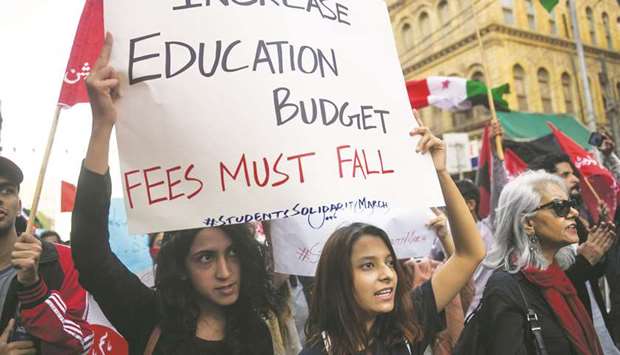Scores of Pakistani student leaders studying at international universities have voiced support for the “student solidarity march” that took place across campuses in Pakistan yesterday.
In an open letter addressed to the government, students have come together under the banner of the Pakistan International Students Alliance, and registered opposition to the current ban on student unions in Pakistan.
“The ban on student unions has not only significantly restricted the ability of students to politically mobilise themselves and silenced their political voices, but also prevented students from campaigning on issues crucial to their well-being such as campus safety, fee hikes, accommodation security and many others,” reads the letter, which has been signed by nearly 40 student body leaders from universities including Cambridge University, Cornell University, Harvard University, Mcgill University, and National University of Singapore.
“It is our duty to use our privilege and the resources at our disposal to further the values of democracy, representation and progress in the country we call home,” the letter adds.
The letter has been undersigned by the student presidents of Pakistan societies in universities in the UK, US, Canada, Australia, and Singapore.
Together, these students represent the interests of thousands of Pakistani students enrolled in these universities across countries.
In the midst of fee hikes, harassment scandals and arrests from campuses, students across the country came together for a Student Solidarity March yesterday to demand better education and a fair academic environment.
One of the key demands of the march’s participants is to lift restrictions that bar students from forming unions.
Organisers say if the government does not meet this demand, they will challenge the ban in the courts.
Laila Tauqeer, president of the Harvard College Pakistani students association, said that the fact that the march is happening is inspiring, even if all the objectives are not achieved.
“There is a greater responsibility on us because we take a lot of things that are being fought for in Pakistan for granted, including the constitutional right to unionise, demand accountability, and protest the general lack of priority accorded to higher education in Pakistan.
“International Pakistani students have access to many of these things, but had we not been in the spaces that we are in today, we would also be facing the same problems, and rising up against them.”
Hamza Tariq Chaudhry, the president of the Pakistan Development Society at the London School of Economics, said: “Our hope is that this can help buttress the advocacy of students on the ground in Pakistan, and signal to the government the grave concerns held by a significant constituency of their electorate: international Pakistanis.”
He added that international students hope to develop formal connections with student groups within Pakistan and work together to determine how students abroad can help their colleagues back home.

Protesters take part in a demonstration in Karachi to demand the reinstatement of student unions, education fee cuts, and better education facilities.
